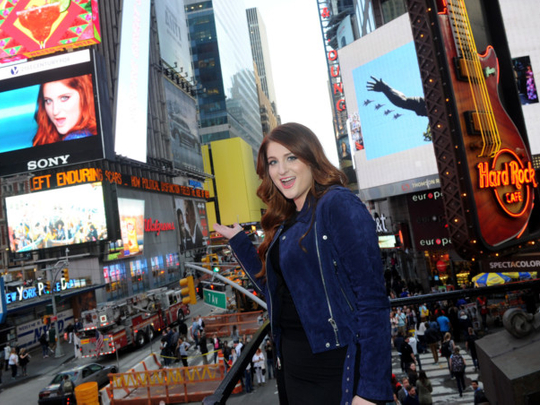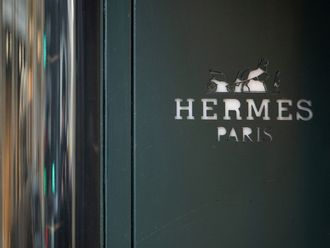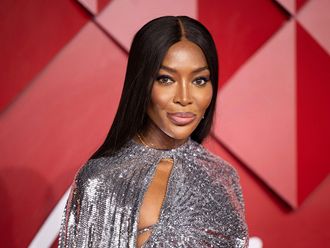
Pop musician Meghan Trainor’s 2014 debut hit All About That Bass blasted over FM radio like a mission statement for the body positivity movement.
“It’s pretty clear I ain’t no size two,” she sang. “But I can shake, shake like I’m supposed to do ... Yeah, my mama she told me don’t worry about your size.”
The Guardian wrote that the song’s “true selling point is its unswerving body-positivism,” and Trainor herself told Billboard it’s “a song about loving your body.”
In fact, its lyrics specifically take magazines to task for using Photoshop to distort the reality of some women’s bodies. “I see the magazines working that Photoshop / We know that [expletive] ain’t real, come on now, make it stop/If you got beauty beauty just raise ‘em up/cause every inch of you is perfect from the bottom to the top.”
The accompanying music video included a satirical twist on that image alteration. Generally, magazines are known for making women appear smaller than they really are. The video, echoing the “big is beautiful” theme of the song, flipped the script, plumping up a skinnier model.
In a note on genius.com, a website that allows fans and artists to discuss the meaning of lyrics, Trainor wrote of the tune, “In the very beginning of my career I saw this happening and would complain to the editors ‘you do realise what my song says right?’ Recently, I saw a picture and was convinced it was Photoshopped and made my label send me the original picture. Turns out it wasn’t and it was just a colouring thing, but I am always on top of that stuff.”
So you can imagine her surprise and dismay on Monday when the video for her new single, Me Too, aired featuring Trainor with a smaller waist than she actually has. After Twitter users called the alterations to her attention — one tweet, “The people who edited the Me Too video photoshopped @Meghan_Trainor That’s so stupid. I hate body standards. It will still look good!” - she quickly pulled the video from Vevo and YouTube and released a Snapchat explaining that she wasn’t aware the video had been altered.
“Hey guys, I took down the Me Too video because they Photoshopped the [expletive] outta me, and I’m so sick of it, and I’m over it,” Trainor said in the Snap. “My waist is not that teeny, I had a bomb waist that night, I don’t know why they didn’t like my waist. I didn’t approve that video and it went out to the world. So I’m embarrassed.”
“I screamed in my hotel room,” Trainor told USA Today, recalling the moment when she realised the video had been modified. “I was like, ‘Why would they do this?’ I cried. I had to try not to cry because I had my [make-up] done, and was like, ‘Don’t ruin this. Go work and ignore it,’ but I couldn’t help it.”
A new, unaltered version of the video is expected to premiere Tuesday.
“I approved a new version that should be coming out tomorrow morning,” Trainor told Billboard on Monday.
The conversation around body image has grown tremendously in recent years in pop culture, particularly in music. Alongside Trainor’s All About that Bass, songs like MIKA’s Big Girl (You Are Beautiful), Colbie Caillat’s Try and Jason Mraz’s The Beauty in Ugly have been called “body positive.” (There are many more. Naturally, BuzzFeed hosts a list.)
But the conversation extends far beyond the realm of music. Earlier this year, Mattel released new versions of Barbie to include more body types, including “curvy,” a term often synonymous with “plus-size.” Last year, The Washington Post stated that “body positivity” has gone “mainstream.” Also last year, model Ashley Graham made headlines for being the first “plus-size” model to appear on the cover of Sports Illustrated’s annual swimsuit issue.
More recently, she found herself in the midst of a controversy after being the first “plus-size” model to appear on the cover of Maxim. In the cover, she holds a white button-down shirt against her body, which is clad in nothing more. The magazine cover reads, “Natural beauty turned brand builder.”
Almost immediately, Twitter filled with accusations that Graham had been Photoshopped: “So much for #BodyAcceptance! #AshleyGraham’s Maxim shoot was retouched to make her look slimmer. https: t.co/pgtghhQCDb”
The model denied this charge in a statement.
“I’m beyond proud to be the first curvy woman on the cover of Maxim,” she said. “I was not slimmed down on the cover, and Gilles Bensimon did an amazing job capturing my true figure in all of the photos. This is another major advancement for curvy women, especially those who work in the fashion industry who are working hard to get the recognition they deserve.”
Still, it’s another example of how charged the discussion around body size and image can be, especially in the internet age when opinions are but a click away.
The conversation is so charged that even the nomenclature itself has been hotly debated. When Graham made her Sports Illustrated cover debut, she was a size 14, which Daily Beast reported is the size of the average American woman. Given that, the magazine suggested the term “plus-size” is “ludicrous.” One tweet: Ashley Graham is the “safe” version of fat people, they won’t put anyone bigger than her on a magazine cover for a looooong time.
“I hope in the next year people will stop saying ‘plus-size,’ and they’ll just say, ‘She’s a model,’” Graham told The Daily Beast. “I think that the day is coming.”
Amy Schumer echoed that sentiment after Glamour magazine published a special edition focused on plus-sized women. Its tagline announced “Chic At Any Size!” and it featured plus-size celebrities such as Melissa McCarthy, Adele, Ashley Graham and Amy Schumer.
The comedian, though, wasn’t thrilled with the classification. She wrote on Instagram, Glamour “put me in their plus size only issue without asking or letting me know and it doesn’t feel right to me. Young girls seeing my body type thinking that is plus size? What are your thoughts? Mine are not cool glamour not glamorous.” She also clarified, “I think there’s nothing wrong with being plus size. Beautiful healthy women. Plus size is considered size 16 in America. I go between a size six and an eight.”
Trainor herself has railed against the term, telling ELLE that the phrase is insulting in a country where many women would fit the designation (though it should be noted that “plus-size” remains a subjective term: there is no specific measurement in place that denotes the term’s usage).
“I’ve always hated the word ‘plus-size.’ It bugs me,” Trainor said. “The word ‘plus-sized’ should be gone.”
Instead of focusing on how culture as a whole perceives various body types, her music focuses on personal body positivity. In Me Too, she sings, “Who’s that sexy thing I see over there?/That’s me, standing in the mirror ... I can’t help loving myself/And I don’t need nobody else.”
Trainor’s new record Thank You drops on Friday.













